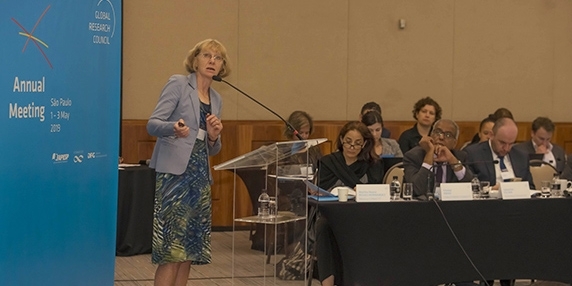

Organizations in the Asia-Pacific region are developing ways to make grant approval procedures more transparent and to encourage young researchers to follow a long-term career in science (photo: Prue Williams, General Manager of Science Investments at New Zealand’s Ministry of Business, Innovation and Employment (MBIE) / Piu Dip, Agência FAPESP)
Organizations in the Asia-Pacific region are developing ways to make grant approval procedures more transparent and to encourage young researchers to follow a long-term career in science.
Organizations in the Asia-Pacific region are developing ways to make grant approval procedures more transparent and to encourage young researchers to follow a long-term career in science.

Organizations in the Asia-Pacific region are developing ways to make grant approval procedures more transparent and to encourage young researchers to follow a long-term career in science (photo: Prue Williams, General Manager of Science Investments at New Zealand’s Ministry of Business, Innovation and Employment (MBIE) / Piu Dip, Agência FAPESP)
By André Julião | Agência FAPESP – Research funding agencies in countries of the Asia-Pacific region want to make the processes whereby they assess proposals more accurate and transparent. They also want to encourage young researchers to follow a long-term scientific career.
Both topics were discussed at the Asia-Pacific regional meeting held during the 8th Annual Meeting of the Global Research Council (GRC).
The GRC summit took place on May 1-3, 2019, in São Paulo, Brazil. It was attended by heads of research funding agencies from 50 countries on all five continents, and organized by the São Paulo Research Foundation (FAPESP), Argentina’s National Scientific and Technical Research Council (CONICET) and the German Research Foundation (DFG).
“Like other research funding agencies, we have a competitive system. We want researchers to be assessed without bias or conflicts of interest, so at the end of the merit review we want to be able to show the researchers whose proposals aren’t approved that the process is fair and based on criteria. Indeed, we recently introduced the practice of letting researchers look at the reviewers’ assessments,” said Prue Williams, General Manager of Science Investments at New Zealand’s Ministry of Business, Innovation and Employment (MBIE).
With just under 5 million inhabitants, New Zealand has addressed the problem of not having enough researchers to act as peer reviewers in every knowledge area by creating an international network of reviewers. The intent is to guarantee a fair assessment process. “We spend a lot of time searching for scientists to act as reviewers and help us by joining the system,” Williams told Agência FAPESP.
Sri Lanka also has a very small scientific community. “Each scientist’s assessments would eventually be known to others and there would be criticisms, so we’re studying the implementation of some kind of system based on artificial intelligence, which could be used to find out whether someone else has already done the research described in a proposal and what knowledge exists on the subject,” said Ananda Jayawardane, Director General of Sri Lanka’s National Science Foundation (NSF).
China has large numbers of researchers and proposals submitted annually. The National Science Foundation of China (NSFC) also plans to start using artificial intelligence (AI) to review research projects within the next few years.
NSFC President Jinghai Li explained that an AI-assisted review system will be introduced in five to 10 years’ time so that proposals can be matched with the reviewers best suited to assess them.
Meanwhile, the funding organization plans to use a peer review system based on the principles of responsibility, merit, and contributions to the field. The system calls for active participation by scientists so that it is fair and accurate, and reflects the performance of researchers.
“In future, when we’ve finished this reform, the core of our system will be originality and transdisciplinarity,” Jinghai said.
Young researchers
The meeting also discussed the issue of incentives for young researchers. Yoshiko Shirokizawa, Executive Director of the Japan Science and Technology Agency (JST), described ACT-X, a new program of scientific career incentives for researchers who have earned a PhD less than eight years previously or a first degree less than 13 years previously (if they do not yet have a PhD).
“The program is designed to support our young researchers by providing stable funding so that they can focus consistently on developing innovations,” Shirokizawa said.
A highlight of the program is the exclusion from the 13-year calculation of any period in which the applicant was on maternity or paternity leave.
Another JST program funds researchers who at some point in their careers experience situations such as childbirth or have to care for others, including sick or elderly relatives. These are factors that mostly prevent women from having a long-term scientific career.
A grant of JPY250,000 per month, equivalent to about USD2,250, can be used to defray expenses that contribute to the research and help reduce the researcher’s workload, paying for an assistant or equipment and office supplies or other inputs.
More information on the 8th Annual Meeting of the Global Research Council: www.fapesp.br/eventos/grc.
Republish
The Agency FAPESP licenses news via Creative Commons (CC-BY-NC-ND) so that they can be republished free of charge and in a simple way by other digital or printed vehicles. Agência FAPESP must be credited as the source of the content being republished and the name of the reporter (if any) must be attributed. Using the HMTL button below allows compliance with these rules, detailed in Digital Republishing Policy FAPESP.





